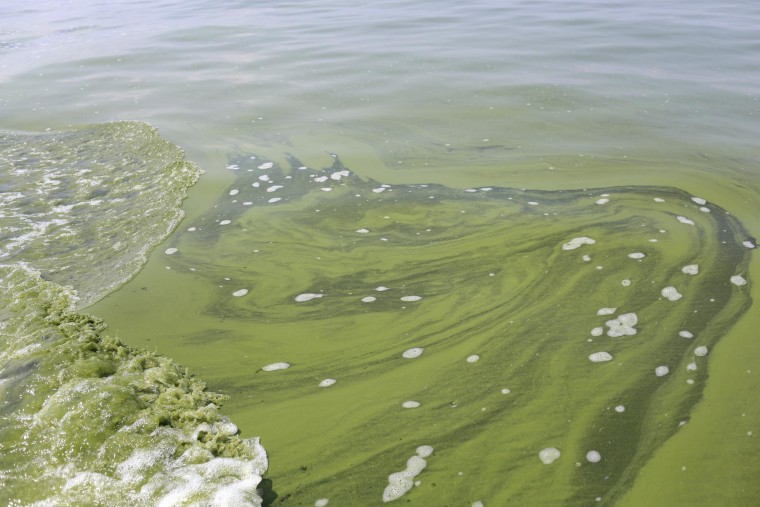The blue-green algae that residents of Toledo, Ohio are calling the "Incredible Hulk" closed restaurants, disrupted sports events and has already cost the city $200,000 in cleanup costs after the weekend’s drinking-water ban -- and there's no guarantee it won't happen again.
“People don’t understand the value of a public good like water quality until you don’t have it,” said Noah Dormady, an assistant professor of public policy at John Glenn School of Public Affairs at Ohio State University. “The value and essentially the cost of losing that service really show up when you don’t have it anymore.”
The slimy culprit originated in Lake Erie, which supplies the city’s drinking water. An overgrowth or “algal bloom” can produce toxins that affect the nervous system, liver and skin, according to the EPA. At the weekend, Toledo residents were told not to drink the water and restaurants were ordered closed unless they could manage everything from hand-washing to ice-making with bottled water. The ban was lifted on Monday.
Public information officer Lisa Ward said on Monday it was too early to put a final tally on the cost of the contamination. As of midday Sunday, the city’s cost of cleanup was at about $200,000, she said. “Those costs are going to go up a little bit,” she said.
As for the impact on the city’s tax rolls, “We hope it’s going to be minimal,” Ward said. The county and state could also wind up shouldering some of the cost, she said.
Over the weekend, the city’s restaurants bore the most immediate brunt of the economic impact. “It’s very difficult for a small business,” said Zach Lahey, owner of Manhattan’s Restaurant in Toledo, which closed Saturday and Sunday in response to the water crisis Calling Sunday brunch “one of our major moneymakers for the week,” Lahey estimated he lost about $10,000 in sales just in those two days, and had to tell about 20 employees not to come in over the weekend.
Jarrod Clabaugh, spokesman for the Ohio Restaurant Association, said some restaurants managed to remain open by serving food on paper plates, using plastic knives and forks and bottled water. “Some restaurants strictly served fried foods to guests in order to avoid the use of water in food preparation,” he said via email.
The city’s tourism sector, which emphasizes sports and activities on Lake Erie, also felt the sting. “Over the weekend was difficult for a number of reasons,” said Richard Nachazel, president of Destination Toledo, the city’s convention and visitors bureau. While some hotels were able to carry out weddings that had been booked and cater to guests by resorting to bottled water and paper plates, some youth sporting events had to be canceled.
“We did have some loss of hotel room nights, but nothing into the future,” Nachazel said.
Nachazel said that the algae situation is not a new problem for the city. Although researchers at area universities are working on ways to stem algal blooms, Toledo’s water bill could climb even higher in the future.
“Declining water quality in Lake Erie has resulted in an increased need for treatment chemicals,” the city’s 2014 budget noted. For 2014, it budgeted $11 million for “chemicals and spent lime disposal” in water treatment.
Dormady warned that repeated instances of contamination or bans of longer duration would be especially dire for businesses, he said. Businesses would either have to close to implement costly work-arounds. Residents would divert more of their spending from other areas to focus on obtaining water, and restaurant workers would be effectively unemployed.
